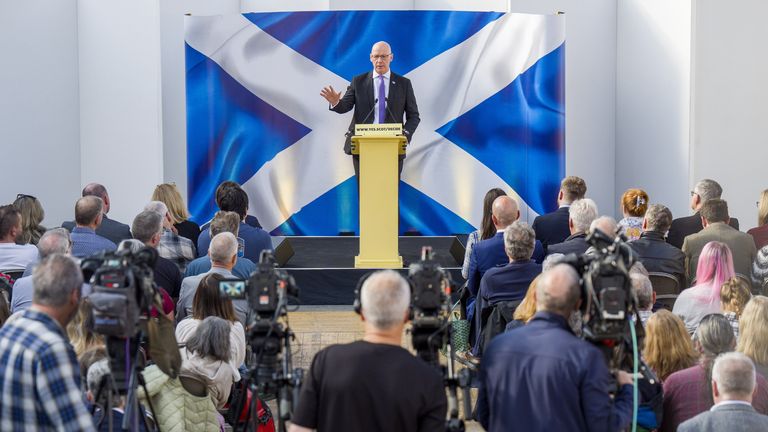Scotland's first minister sets out latest plan for independence referendum

First Minister John Swinney has called on the UK government to agree to another referendum on Scottish independence if a majority of SNP MSPs are elected at the 2026 Holyrood election.
Mr Swinney hopes to repeat the party's success in 2011, which led to the 2014 independence referendum.
That ballot, in which a 55-45% majority of Scots voted to remain part of the UK, was described at the time as being a "once in a generation" opportunity.
Responding to opponents who say it is too soon for another ballot, the first minister said: "By 2030, there will be one million young Scots eligible to vote who were too young in 2014.
"Some of them will not even have been born then. That seems like a generation to me."

Scotland is facing a "pivotal moment", he insisted, as he told supporters at an event in Edinburgh that Westminster governments have "failed to deliver higher living standards".
Looking ahead to a future in the UK "under Labour, under Tory, or as is looking increasingly likely, Nigel Farage", the SNP leader went on to declare: "I would not be doing my duty were I not to offer people a very different choice."
His comments came as the Scottish government published a new paper calling on the UK government to "make a clear commitment to respect the people of Scotland's right to decide their future".
The Scottish government "believes that it is a fundamental feature of Scottish parliamentary democracy that the Scottish people can decide to hold a referendum through their votes in Scottish parliament elections", the paper added.
It went on to stress the importance of the UK government and parliament "recognising and giving effect to that decision as they did in 2014″.
Mr Swinney noted the 2014 referendum "took place following a majority SNP win in the 2011 election".
He added: "That is the precedent - and that is what I am determined to repeat."
Read more from Sky News:Why next year's Scottish elections could get messySNP membership falls and deficit soars
Speaking to journalists after his speech, Mr Swinney said the party's position was that another referendum required a majority because Westminster "ignored" previous pro-independence majorities in 2016 and 2021.
"I'm simply looking at reality, saying at what time, at what moment did an independence referendum happen?" he said.
"It happened in 2014, after an election in which the SNP won a majority of seats in the Scottish parliament on our own and I'm advancing the argument, which I think has got a lot of substance, because it relies on the principles of precedent."
He set out his goal at a time when he said, "giving people a choice over their future has never been more important, more urgent or more necessary".
He said: "At this pivotal moment in our story as a country - as our world changes rapidly around us, and as Westminster moves ever further away from the daily priorities of people in Scotland - let us come together and demand a say over our future."
The UK government has turned down requests from successive SNP first ministers for a second referendum, despite the Scottish elections in 2016 and 2021 both returning a majority of pro-independence MSPs.
A UK government spokesperson said: "This is simply not a priority for Scots. The UK government's priority is delivering for people in Scotland.
"The Scottish government should be focused on working with us on our Plan for Change: to grow the economy, improve our public services, and put more money in people's pockets - that is what Scots want to see."
Sky News




